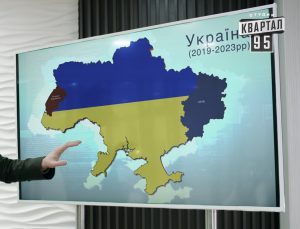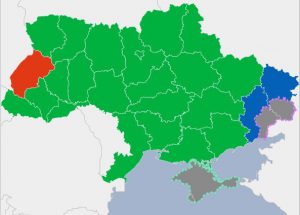Alexander Rojavin, Law & Public Policy Scholar, JD Anticipated May 2020
Acting White House Chief of Staff Mick Mulvaney has confirmed what we already knew—that in an act of policymaking staggeringly harmful to the United States’ interests, the White House froze nearly $400 million in military aid to Ukraine unless Ukraine’s young administration helped fabricate a case against former Vice President Joe Biden. (No, it had nothing to do with Viktor Shokin, Ukraine’s reviled former attorney general who got the job primarily because he was then-President Poroshenko’s buddy). Together with our inspired plan to abandon Syria—thus ceding all strategic advantage to the Erdogan, Putin, and Assad regimes and exacerbating an already dire humanitarian crisis—this is but the latest in a long string of Trumpian foreign policy decisions that curiously fit rather neatly into the Kremlin’s own foreign policy.
Consider whom we are depriving of military aid: Ukraine. The same Ukraine that has been fighting Russia for five years (and politically resisting it ever since its independence). The same Ukraine that has lost over 13,000 civilians and soldiers in its war. The very same Ukraine that, according to any map, physically forms the West’s frontline against Russian aggression (an “honor” shared by Georgia, which got a taste of what that meant six years before Ukraine did). This is the largest country in Europe that, since 2014, has been earnestly working towards EU and NATO membership, because it genuinely believes in the Western democratic paradigm. This is the Ukraine that we are denying military aid.
And as if denying the aid weren’t enough, Trump is also interfering with President Volodymyr Zelensky’s ability to counter the Kremlin’s information war. Zelensky was elected to the Ukrainian presidency with a staggering 73% of the vote—the largest split since Ukraine’s independence. His election—despite being met with skepticism from abroad (“He’s inexperienced!” “Putin will walk all over him!“)—provided him with an overwhelming mandate that was borne not only of his independence from existing political forces and vision of Ukraine, but also because he, as a longtime actor and parody artist (who finished law school), was perceived as being best equipped to wage the information war against the Kremlin.
After all, a few weeks before the runoff election, Zelensky released a video in which he challenged President Petro Poroshenko to a debate, and he did so while walking out onto a sports stadium. The framing of the shot made it so that right behind him was the 73rd section of seats, with the prophetic 73 just to the side of his head. While this could and likely should be chalked up to luck, there is another, more intentional example: in the last episode of Servant of the People (the show in which Zelensky starred as the President and that is tonally something of an analogue to The West Wing), Ukraine is fractured into dozens of independent region-states and is slowly glued back together by the President’s team until only the Russophilic far east and the nationalist far west remain. The map looks like this:

Meanwhile, the map of the subsequent parliamentary elections looks like this (green indicating majority or plurality support for Zelensky’s party):

As economist Andrei Illarionov remarked, “These guys get something about Ukraine that others don’t see yet.“
In the months following his election, Zelensky would repeatedly prove his critics wrong, employing a rhetoric that unflinchingly labeled Russia as an aggressor, maintained Ukraine’s legally inviolable sovereignty, and generally cast Ukraine as a nation in the European mold, irrevocably unshackled from its Soviet past. One needed only look at the difference in how Ukraine and Russia welcomed home the prisoners of war exchanged in their “35 for 35” deal in September. When the Ukrainians touched down, they were greeted by a smiling Zelensky and, much more importantly, by their families and friends. Meanwhile, when the Russian prisoners returned home, their welcome party consisted of the Kremlin’s loyal propagandists, Rossiya 1’s Dmitry Kiselev and Olga Skabeeva. Russian talk shows took to spinning the story as a massive victory for the Kremlin. However, the exchange rate between pictures and words is well known.
As President, Zelensky most clearly explained his rhetorical strategy in a “100 days in office” interview. “We are not going to other countries with an outstretched hand.” He stated that when meeting representatives of other states, he would not come as a beggar, but as an equal. He would not “ask” for anything, but “discuss” how Ukraine and other nations could work together, how to drive economic growth through investment and expertise exchange. Furthermore, he would try to make it so that other heads of state would come to Ukraine rather than having to bounce around the globe at the beck and call of others. The Ukraine of Zelensky’s rhetoric is a “strong,” “independent” nation that should not be pitied, but regarded as a vital strategic partner—which one need only look at a map to understand that it is.
Armed with this vision and reputation, Zelensky suddenly found himself thrust into a nightmare scenario: waging war with Russia in the east and suddenly being extorted by what should be one of Ukraine’s most stalwart Western allies—the United States. Suddenly facing the White House’s current occupant in a surreal phone call, Zelensky made for the UN summit just a few months later—and then the news broke, the transcript memo was released, and Zelensky now had to publically keep to his rhetorical strategy while negotiating the single-mindedness of Trump.
At their joint press conference, Zelensky did exactly what he said he would do in his “100 days” interview. He insisted that Trump visit Ukraine. And when Trump remarked about “helping” Ukraine, Zelensky shot back with a smile, “We don’t need help, we need support.” In doing so, he executed the two main points of his rhetorical policy: paint Ukraine as strong and independent and reinforce that image by trying to get other heads of state to visit. Nobody is under the illusion that Trump actually will visit, but by posing the question at all, Zelensky hopes to introduce people to the possibility, nurture it for a time, and then (possibly years down the line) finally make it happen.
However, Zelensky was simultaneously forced to address the phone call. He first stated that Ukraine seeks to combat corruption to the best of its ability. This vague answer was designed to assuage Trump and simultaneously make it clear that Ukraine does not want to involve itself with the American electoral process—something he then reiterated explicitly. This position became even more apparent when an irritated Zelensky switched to Ukrainian and explained that Ukraine has bigger problems than investigating Biden – Ukraine’s resources are needed elsewhere. What he put more diplomatically in English, he made abundantly clear in Ukrainian: that Ukraine will not involve itself with U.S. elections, nor will it give in to Trump’s demand.
Zelensky’s response that he did not feel “pressured” by Trump, while not fitting as nicely into the Democratic narrative, does fit in to the goal of presenting Ukraine as strong and independent. He did not feel pressured, because Ukraine is immune to such pressure, because Ukraine is the United States’ equal. This perhaps most clearly is the purest distillation of his rhetorical strategy.
Combating the Kremlin’s disinformation campaign is complicated enough, and Zelensky likely had little desire to handle disinformation from the United States as well. But because of Ukraine’s dire situation, he was forced to smile at Trump as his interlocutor advised him to meet with Putin and make it all better. Because who has Ukraine’s and the United States’ best interests at heart but Vladimir Vladimirovich?
This story is but one example of Trump’s foreign policies, which traditionally further the interests of the Kremlin and damage the interests of the West and the West’s ability to counter the Kremlin’s information war. It is true that if there is one Western head of state who is best equipped to deal with the complexities of countering multiple information wars, a very good argument exists that President Zelensky is that head of state (his juggling act continues as he deals with fallout from the Steinmeier Formula). But ignoring the military aspect of the West’s clash with Russia is brazenly irresponsible, and holding military aid to Ukraine as a bargaining tool is an abdication of the United States’ duty and a betrayal of the Western order.

You must be logged in to post a comment.